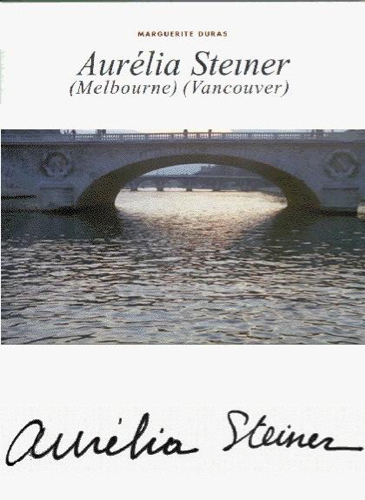Aurélia Steiner - Melbourne
-
Réalisé par Marguerite Duras • Écrit par Marguerite Duras
-
France • 1978 • 35 minutes • 35 mm • Couleur
- Réalisation :
Marguerite Duras - Écriture :
Marguerite Duras - Image :
Pierre Lhomme - Son :
Michel Vionnet - Montage :
Geneviève Dufour - Voix off :
Marguerite Duras
- Production (structure) :
Paris audiovisuel, Paulo Branco - Participation :
Institut français. Département Cinéma - Ayant droit :
Paris audiovisuel, Paulo Branco
- N° ISAN :
non renseigné
Résumé
Une embarcation invisible glisse sur la Seine que la nuit envahit peu à peu. Le son livre la lettre d'amour universel que lance une adolescente australienne à travers l'espace et le temps.
"Le texte dit par Marguerite Duras est une lettre, un appel, une évocation amoureuse. Le destinataire n’est pas vraiment désigné, on ne sait même pas s’il existe. Tout est censé être dit par une jeune fille de 18 ans.
Parfois, il est question d’un fleuve, des voûtes d’un fleuve, et le texte semble alors se rapprocher de l’image : une série de travellings pris d’une péniche avançant le long de la Seine."
(Dominique Noguez, 1984)
To show on the basis of something being missing, such is no doubt the obsessive quest in the films of Marguerite Duras. Like her stories and novels, they explore absence (of meaning, of the other); and her films are full of the idea of her own death; of its inability ever to replace the text. While Marguerite Duras has made screen versions of some of her narratives (her way of exhausting them perhaps), this cycle dating from 1979 is taken from no independent writing. The writing is introduced beneath, or beyond, the pictures, it never accompanies them. These four shorts are not blind films in which Duras took her experimentations with the cinema to their limits (L’Homme atlantique, of 1981, for instance). But they do carry the premises of it, being full of that ‘tepid softness of the threatened image’. They in fact start a transition, taking the disassociation of the picture and the soundtrack further on from work like India Song (1974), with a more conventional narrative structure.
Mot(s)-clé(s) thématique(s)
Sélections et distinctions
- 2014 • FIDMarseille - Festival International de Cinéma de Marseille • Marseille (France) • Sélection Écrans parallèles
Comment avoir accès au film ?
- Sortie en salle
- Édition DVD
-
Accès VOD
- Il n'existe pas d'accès en VOD à notre connaissance
- Distribution
- Aide sur les moyens d'accéder à un film


